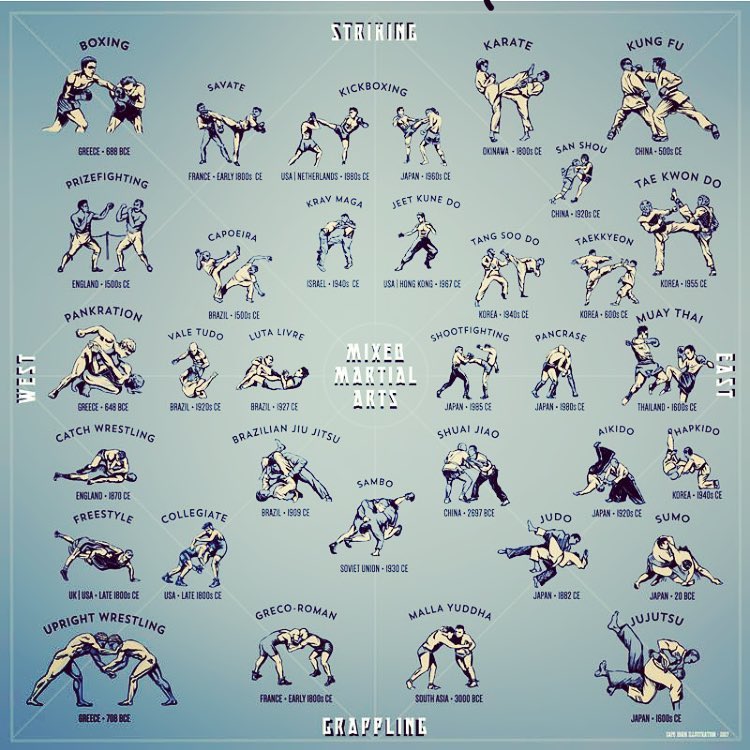5 Famous Martial Artists That Changed The Training Course Of Background
5 Famous Martial Artists That Changed The Training Course Of Background
Blog Article
Content Writer-Cooke Fry
You may not recognize it, yet the world has been shaped by the actions of a choose couple of martial musicians. These people have left an enduring mark on background, paving the way for generations of competitors and professionals ahead. They reinvented their corresponding arts, challenged the norms of society, and pushed the borders of what was thought feasible.
In this short article, we will check out the lives and legacies of five famous martial musicians that transformed the program of history. From the Daddy of Modern Fighting Style to the Greatest Samurai of All Time, these legendary figures have inspired millions worldwide. They have come to be household names, identified with nerve, discipline, and perseverance.
With their teachings and actions, they have revealed us what it suggests to be a true warrior. So, join us as we delve into the fascinating globe of fighting styles and discover the impact that these five people carried history.
Bruce Lee: The Daddy of Modern Fighting Style
You can't discuss fighting styles without discussing Bruce Lee - he's the one that revolutionized the whole sector and brought to life the modern period of combating. His impact still resonates today, and a number of the techniques he created are still utilized by fighters around the globe.
Lee was not just a competent martial musician yet also a thinker, star, and filmmaker who aided bring Eastern fighting styles to the Western globe. what is best martial art for street fighting 's most substantial contribution to fighting styles was his growth of Jeet Kune Do, a fighting style that highlighted simplicity, directness, and performance. He believed that martial artists should use just the methods that worked for them, as opposed to sticking to a stringent collection of rules or kinds.
He also highlighted the relevance of physical conditioning, psychological discipline, and self-awareness, suggesting that martial arts were not just about battling, but also concerning personal development and growth. Lee's legacy remains to inspire martial musicians and non-martial musicians alike, and his influence on the world of combating will never ever be failed to remember.
Miyamoto Musashi: The Greatest Samurai of Perpetuity
Oh boy, Miyamoto Musashi is one strong samurai. He's the greatest of perpetuity, and do not you forget it.
Birthed in 1584, Musashi was a legendary swordsman who was undefeated in over 60 duels. He was also an experienced calligrapher, painter, and theorist. He wrote 'Guide of 5 Rings,' a traditional text on strategy and fighting styles.
Musashi's life contained experience and danger. He combated in the Battle of Sekigahara, where he sustained the victorious Tokugawa clan. Later, he ended up being a wandering samurai, testing various other swordsmen to battles and developing his skills. He also combated versus an institution of spear-wielding warriors, beating them with only a wooden sword.
Musashi's legacy continues to influence martial musicians today, and his name is synonymous with the samurai spirit of self-control, guts, and honor.
Ip Man: The Master That Brought Wing Chun to the World
Ip Man was a famous fighting styles master who promoted and spread the Wing Chun style to the globe. He was born in the Foshan city of Guangdong province in China and grew up discovering fighting styles from various educators. Ip Guy's abilities in Wing Chun were unequaled, and he ended up being referred to as a master in the art. He was additionally known for his humbleness, self-control, and regard for the fighting styles.
Ip Male's tradition survives today, and his contributions to the world of martial arts are immeasurable. Right here are three reasons that he is regarded as among the best martial musicians of perpetuity:
- He taught the fabulous Bruce Lee. Ip Guy was the first fighting styles understand to educate the young Bruce Lee, that took place to turn into one of the most famous stars and martial artists of all time.
- He promoted the serene use martial arts. Ip Man believed that martial arts must be made use of for protection and except physical violence. He always advertised the calm use of fighting styles, and his students followed his instance.
- He spread the Wing Chun style to the globe. Ip Guy contributed in spreading the Wing Chun design to the world. He taught several students, and his trainings eventually ended up being prominent in Hong Kong and various other parts of the world. Today, Wing Chun is exercised by millions of people all over the world, and it owes a lot of its appeal to Ip Man.
Conclusion
Congratulations! martial arts cardiff 've simply learned about five well-known martial musicians who transformed the course of history.
Bruce Lee was the dad of modern fighting styles. Miyamoto Musashi was the best samurai of all time. Ip Man was the master who brought Wing Chun to the world.
Their legacies have actually motivated countless people to pursue fighting styles, both as a way of protection and as a method to enhance their physical and psychological well-being. Actually, much of today's leading martial musicians debt these epic figures as their best impacts.
For instance, allow's have a look at the case of UFC champion Conor McGregor. McGregor has frequently cited Bruce Lee as one of his most significant inspirations and has actually also incorporated Lee's popular "be like water"viewpoint right into his dealing with style.
By examining the techniques and ideologies of these fighting styles pioneers, McGregor has actually turned into one of the most successful and well-respected fighters on the planet.
So whether you're an experienced martial artist or just beginning, remember the words of these legends and utilize their teachings to assist you on your trip. That understands, perhaps someday you'll be the following martial arts icon to transform the program of history.
